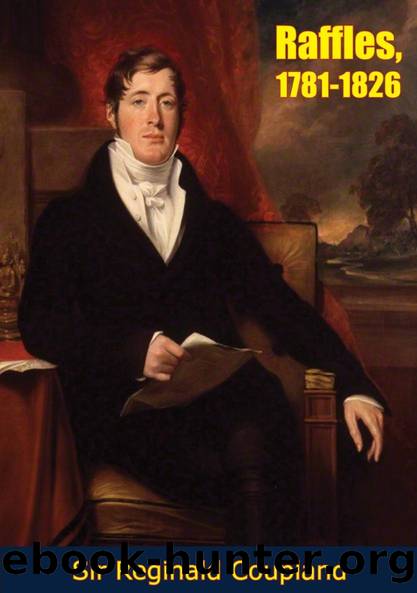Raffles, 1781-1826 by Sir Reginald Coupland

Author:Sir Reginald Coupland [Coupland, Sir Reginald]
Language: eng
Format: epub
Tags: History, Europe, Great Britain, General, Military, Wars & Conflicts (Other), Ireland, Special Forces
ISBN: 9781787208513
Google: ay5BDwAAQBAJ
Publisher: Pickle Partners Publishing
Published: 2017-01-12T03:03:49+00:00
X
THE first Lieutenant-Governor of Bencoolen found his realm in ruins. Neglected by the Company during the war and then smitten by a series of earthquakes, the little maritime settlement lay almost derelict. âThis is, without exception, the most wretched place I ever beheldâ, wrote Raffles; âI cannot convey to you an adequate idea of the state of ruin and dilapidation which surrounds me....The roads are impassable; the highways in the town overrun with rank grass; the Government-house a den of ravenous dogs and polecats. The natives say that Bencoolen is now a tana mati (dead land). I think I could never have conceived anything half so bad.â Was Raffles, then, disheartened at the outset? Not in the least. The desolate scene had instantly excited all his passion for reconstruction and reform. âWe will try and make it betterâ, he continues, and the whole passage is very characteristic. âIf I am well supported from home, the west coast may yet be turned to account. You must, however, be prepared for the abolition of slavery; the emancipation of the country people from the forced cultivation of pepper; the discontinuance of the gaming and cock-fighting farms; and a thousand other practices equally disgraceful and repugnant to the British character and government. A complete and thorough reform is indispensable.â
A thousand other practices? With those he specified, at any rate, he was as good as his word. The former agents of the East India Company had taken two black leaves out of their rivalsâ book. The Company owned over 200 African slaves in Bencoolen who were employed in such tasks as loading and unloading its ships. No one had looked after them. The adults were dissolute, the children wretched. Raffles promptly enfranchised them, and his wife set an example of caring for the children. At the same time the native chiefs were approached, both in the neighbourhood of Bencoolen and farther afield, with a view to the suppression of all trade in slaves throughout Sumatra. It was in this cause, too, that Raffles made, a few years later, one of his boldest and most characteristic moves. The island of Pulo Nias, off the Sumatran coast to the north of Bencoolen, was one of the chief centres of the trade, frequented by âdealers in human fleshâ of a type so merciless that they were accustomed to keep their captives âpinioned hand and footâ throughout their voyages. Every year some 1,500 victims were thus shipped from Nias. Clearly this evil could only be dealt with on the spot, and in 1820 Raffles dispatched Commissioners to Pulo Nias, who found the chiefs not merely willing to assist in stopping the trade but anxious for British protection. Raffles accordingly assumed the sovereignty of the island on the Companyâs behalf. He could plead that the Dutch had never been there; that, on the contrary, some slight connexion had long been maintained between the island and the British posts on the Sumatran coast. But the Directors had long ago hardened their hearts against Rafflesâ unauthorised adventures, and they fulminated accordingly.
Download
This site does not store any files on its server. We only index and link to content provided by other sites. Please contact the content providers to delete copyright contents if any and email us, we'll remove relevant links or contents immediately.
The Radium Girls by Kate Moore(12028)
100 Deadly Skills by Clint Emerson(4925)
Rise and Kill First by Ronen Bergman(4788)
The Templars by Dan Jones(4689)
The Doomsday Machine by Daniel Ellsberg(4490)
The Rape of Nanking by Iris Chang(4211)
Killing England by Bill O'Reilly(4001)
Stalin by Stephen Kotkin(3965)
Hitler in Los Angeles by Steven J. Ross(3946)
12 Strong by Doug Stanton(3550)
Hitler's Monsters by Eric Kurlander(3342)
Blood and Sand by Alex Von Tunzelmann(3203)
The Code Book by Simon Singh(3189)
Darkest Hour by Anthony McCarten(3133)
The Art of War Visualized by Jessica Hagy(3007)
Hitler's Flying Saucers: A Guide to German Flying Discs of the Second World War by Stevens Henry(2754)
Babylon's Ark by Lawrence Anthony(2678)
The Second World Wars by Victor Davis Hanson(2524)
Tobruk by Peter Fitzsimons(2516)
